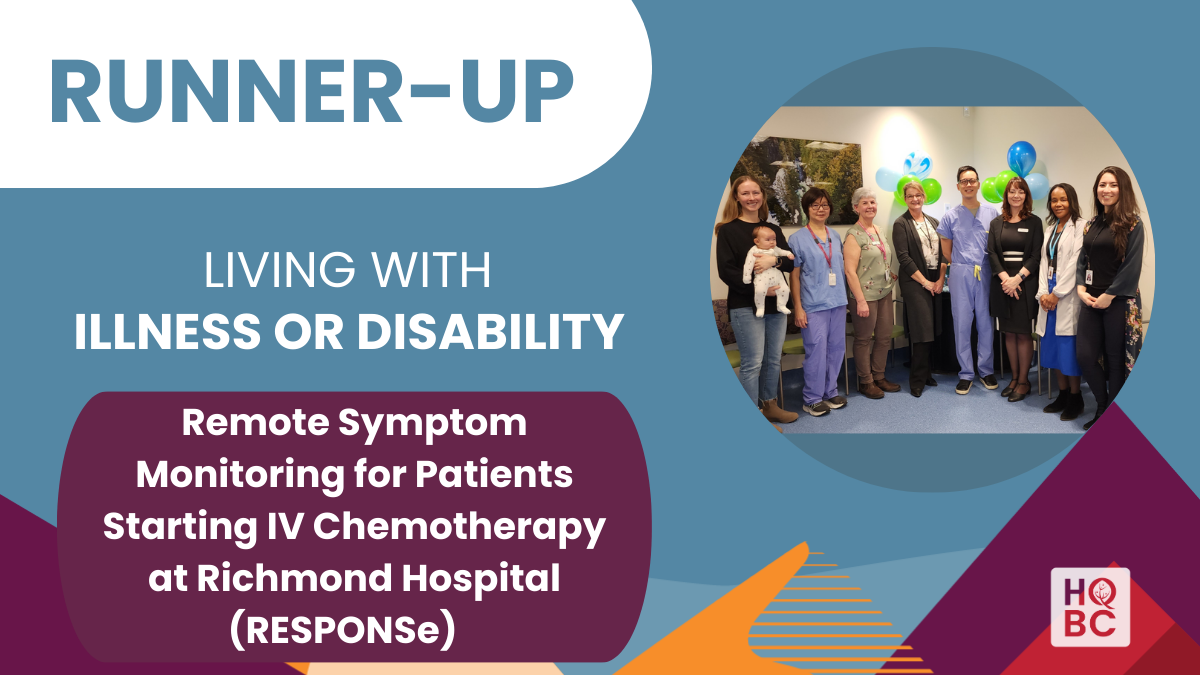- 2025
|
- Runner-Up
|
- Living with Illness or Disability
The Richmond Hospital Cancer Care Remote Symptom and Patient Monitoring System program (RESPONSe) project team exemplifies exceptional performance by addressing a critical gap in the ability to provide timely symptom management during cancer treatment. Understanding that patient-reported outcome measures (PROMs) in oncology can enhance communication and quality of life and reduce symptom burden and acute care utilization, the clinicians collaborated with Virtual Health and VCHRI to form a dedicated project team. The project secured funding from the BC MOH Innovation Fund, VCHRI team grant, Richmond Hospital Foundation, Pfizer Canada quality improvement grant and BC Community Oncology Trialists.
Utilizing an active research approach, the team defined project goals through literature reviews, an environmental scan and interviews and surveys with staff, clinicians and patient partners. This led to the development of the RESPONSe program, a proactive care model integrating a digital remote symptom monitoring (RSM) system and a dedicated Symptom Management Nurse (SMN).
Under the leadership of medical oncologist, Dr. Jeremy Ho, the team and technology vendor designed a digital RSM system to collect PROMs during the first six months of IV chemotherapy. From August 2023 to January 2024, multiple design cycles and dry-run testing were conducted for refinement. Automated triaging logic identifies concerning symptoms flagged on a clinical dashboard monitored by the SMN. Patients self-report symptoms through routine surveys based on pan-Canadian Oncology Symptom Triage and Remote Support (COSTaRS) guidelines. Surveys include a baseline, health checks on days 3 and 10 post-chemotherapy, pre-doctor’s appointment and optional health checks available anytime. Patients also receive self-management tips and access to a comprehensive education library. Concurrently, SMN clinical workflows were developed, covering in-person patient enrollment, digital dashboard monitoring and integration with the clinical chart.
Since its launch on Jan. 22, 2024, 67 patients have enrolled, with 98% completing the baseline survey, 98% at least one post-treatment health check and 82% at least one pre-doctor’s appointment survey. On average, each patient accessed 18 library resources. As of August 2024, the system prompted telephone calls from the SMN for 85 severe and 126 moderate symptoms, with 66 follow-up calls. Early data indicate a lower incidence of ER visits, particularly for nausea, vomiting, dehydration, diarrhea and constipation.
Three-month patient experience surveys indicate high satisfaction, with 100% recommending the program, 82% feeling the system was helpful in communicating issues to the clinical team and 88% feeling supported by the nurse during a call. Narrative feedback indicates that patients feel this to be an effective communication tool with prompt SMN follow-up when required. Acute care usage (ED visits, admissions, length of stay and deaths) for patients on RESPONSe was seen to be reduced during the first 3 months of chemotherapy.
For nurses, eliminating the responsibility of symptom management while administering chemotherapy lets them focus on patients before them. Subsequently, chemotherapy is delivered more safely, job satisfaction increased and moral distress reduced. Anne, a chemotherapy nurse, noted, “I no longer feel my priorities are divided between the patient in front of me and the patient calling in. Often, I couldn’t respond to a patient’s voicemail until the end of the day and couldn’t help but feel I was letting them down. Now I can focus on getting to know my patient and helping them through their journey, which is why I went into oncology nursing in the first place.”
This implementation marks a significant advancement in cancer care at Richmond Hospital. The success of the RESPONSe program highlights digital RSMs’ potential in enhancing patient-centred care and symptom management, providing insights for future provincial care planning. This work requires innovative thinking, flexibility, risk-taking, continuous learning, workflow adaptability to integrate a new nursing role and digital platform and team collaboration to meet project milestones. Already, an updated version incorporating changes based on patient and clinician feedback was rolled out in August and a fully translated traditional Chinese version of the platform went live in December.
This project remains highly visible to the senior administration at VCH through its identification as a project with high impact consistent with the goal of the BC 10-year Cancer Action Plan. Jo-Ann Tait, Vice President for Richmond Community Services, understands that, “with this application, we’re closing crucial communication gaps. It allows us to respond swiftly to patient needs, enhancing their quality of life and potentially reducing emergency visits and hospital admissions.”


